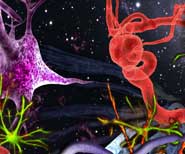The network, entitled Synapses: from Molecules to Brain and Diseases, or SyMBaD, focuses on understanding of how neurones in the brain communicate.
The six universities in the SyMBaD network (Alicante, Bordeaux, Bristol, Geneva, Gottingen and Milan) will team up with five industrial enterprises (Amplitude Systems, Bioxtal, Explora Nova, GlaxoSmithKline and Neurosearch) that are at the forefront of technological advances or research into pharmaceutical drugs for combating neurodegenerative disorders.
Brain diseases represent a considerable social and economic burden. Emerging evidence indicates that synaptic dysfunction, where nerve impulses between cells fail to transmit adequately, is associated with many neurological and psychiatric disorders. New ways of treating such disorders rely on a better knowledge of synapses (the sites where this transmission of information takes place) and the nature of associated conditions. The SyMBaD network aims to increase knowledge in these areas and to train a new generation of European neuroscience researchers.
Professor Zafar Bashir of the Department of Anatomy, who is leading Bristol’s involvement in the project, said: ‘For us to better understand how synapses control normal brain function and how abnormalities in synapses may lead to brain disorders requires working with others who have complementary skills and expertise. This award provides a very exciting opportunity to build collaborations with other European institutes and industrial partners.’ Bristol’s share of the funding amounts to 726,813 euros over three years.
An important aspect of the award is that it provides training for, and movement of, early career researchers between academia and industry and between different European countries. Professor Bashir said: ‘Neuroscience research covers a vast array of different disciplines and there is a need for new researchers to be able to think and work across these different fields. A requirement of this award is that young researchers will move between different centres on collaborative projects and the funding is in place to ensure that this can happen. This will be essential in helping to produce the best possible science in the future’.
The funding is provided through the Marie Curie International Training Network scheme, with PhD positions available from October 2010. To apply for a PhD position, please vist the SyMBaD website or email elaine.sparey@bristol.ac.uk.
More information about neuroscience research at Bristol is available on the Bristol Neuroscience website.
